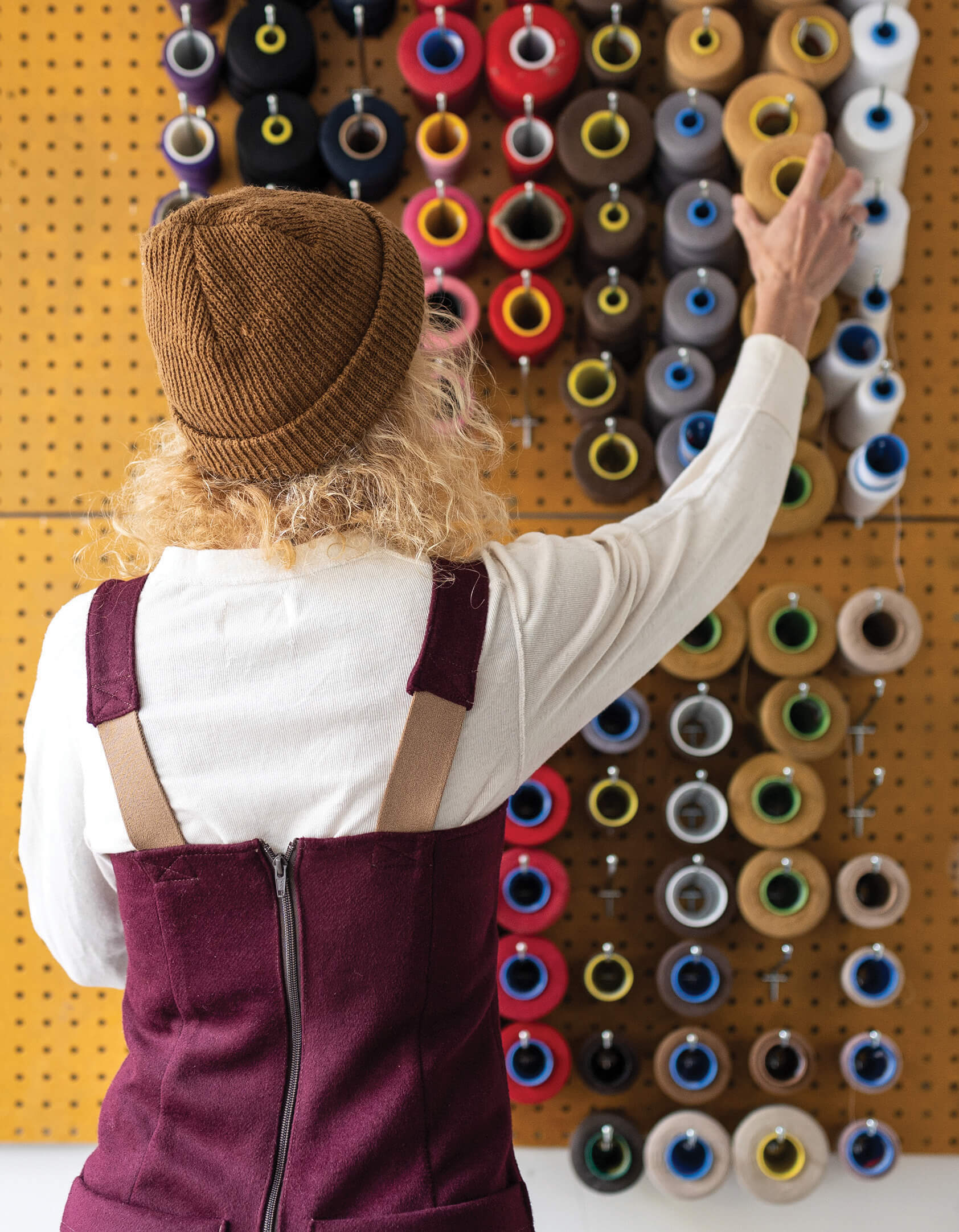
24 Nov Slow Fashion’s Revival
Who made your shirt? I’m not asking about its brand or the country where it was manufactured. Who was the actual person who put in work to make your shirt? I don’t know who made mine, not to mention any of the other shirts I have hanging in my closet. Not knowing is the norm, and it’s been this way for a while — since the industrial revolution changed how we consume and think about garments. But it’s not a norm that Laura Fisher, owner of RevivALL Clothing in Bozeman, Montana, is willing to accept.
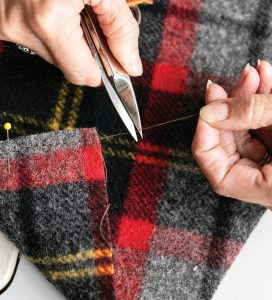
RevivALL Clothing exclusively uses deadstock fabrics for its designs.
“We’re taught to separate our clothing from the maker, but why is that right?” Fisher asks. She knows exactly who made the black and white collared midi dress she’s wearing from RevivALL’s current line. And everyone who buys a RevivALL garment will know, too: Fisher affixes a tag to each item detailing the name and bio of the artisan who crafted it, “because they deserve recognition,” Fisher says. “It’s powerful to know the exact person who made the dress you’re wearing.”
Honoring makers is just one part of what sets RevivALL apart. While the lifestyle brand may be small, its approach to fashion is anything but. Fisher founded RevivALL in 2015 to encourage a “simpler way of life,” one where the clothes we own are few, but they’re meaningful, sustainable, and timeless. Simple methods do not mean simple pieces, however. Fisher pairs romantic silhouettes with durable details, creating fashion that looks as much at home on the streets of Brooklyn as in a Montana pasture.
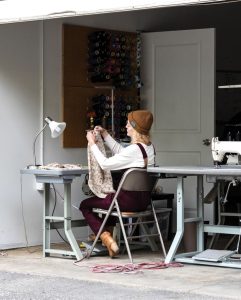
Fisher works on one of her designs in her Bozeman, Montana workshop.
The story of RevivALL begins neither in Brooklyn nor Bozeman but rather the horse country of Maryland. Fisher grew up there amidst the state’s rolling farmland, a world away from the upper echelons of high fashion, which was all well and good, considering a career in design seemed unfathomable to her at the time. “When I was a kid, there was no Etsy, no ‘Project Runway.’ It wasn’t a thought that I, or anyone, could make a living as an independent designer,” says Fisher. Still, fabric held a draw — not as a dream, but as a hobby. Fisher learned to sew from her grandmother, who taught her how to make stuffed animals using spare scraps of material. “That was the first moment I found joy in mixing and matching fabrics and prints.”
It wasn’t until college that Fisher realized she could, and should, consider herself a designer. Her epiphany arrived on a Saturday night while watching television. “When I was a student, ‘Sex and the City’ came out, and many people didn’t care much about it,” Fisher explains. “But for me, watching those women and how they dress, it ignited something inside me.” Fisher knew, suddenly, that she needed to pursue fashion. So, following graduation, she applied to New York’s Fashion Institute of Technology. “It was something I wanted, so I just kind of went for it.”
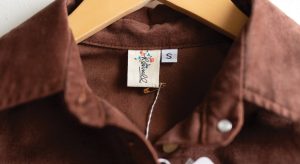
Each RevivALL garment is affixed with a tag identifying the seamstress who made it.
Going for it took believing she could make it as a designer, even though the odds were stacked against her and every student in her class. It was the early 2000s, and a select few designers still ruled the market. “[Fashion design] was something reserved for Ralph Lauren — the big-name people,” Fisher says. Her professors habitually reminded her and her classmates that they’d likely spend their careers getting coffee for the actual designers. But Fisher wouldn’t have it. “I’d always speak up, tell my classmates not to listen, to just do what they want to do.”
New York gave Fisher a crash course in craftsmanship. She learned to turn her designs into usable patterns, sew with industrial machinery, and hustle: On weekends, she’d sell her handmade garments at flea markets across Manhattan’s Lower East Side. But doing the thing, working for years to make it big in the fast-paced nexus of fashion, took a mental toll. “I reached a point where I felt sick of the toxicity, the competition in New York.” Fisher was ready to move on, though she didn’t know where.
Then came Hurricane Katrina, a disaster of such magnitude that sitting back and doing nothing seemed ludicrous to Fisher. “I was already at a crossroads, so when a friend asked me to join her in a volunteer effort, I didn’t hesitate,” she says. She hopped in an RV with a group of women and drove down to New Orleans, where they set up a relief kitchen and donation center. For nine months, Fisher cooked and served three free meals daily, supporting relief workers and residents returning to damaged homes. The operation ran on donations, which meant that Fisher went without money, housing, or many personal possessions for nine months. At night, she slept on wooden pallets alongside other volunteers.
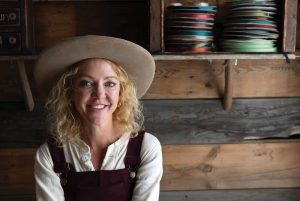
Fisher founded RevivALL in 2015. Her designs are durable yet feminine; made to stand the test of time.
Working in New Orleans transformed Fisher’s thoughts on collaboration, her role in society, and material objects. “It was a time when everything was stripped away. And what was left was people helping people, making a unified and conscious effort to support one another.”
And though she’d meant to leave it behind, design stubbornly followed Fisher down south. “Four or five months into living in New Orleans, I had this urge: I have to start sewing again.” The donation center had an excess of old curtains and bed sheets, as well as a sewing machine. Fisher began refashioning the fabric into feminine dresses and playsuits, complete with ruffles and lace. “I saw myself embracing femininity as a strength instead of a perceived weakness,” she says. “It changed how I thought of the function and comfort of a dress.”
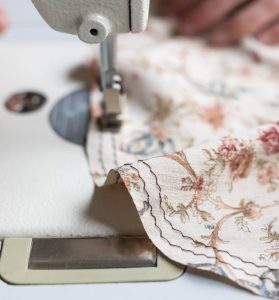
A RevivALL seamstress herself, Fisher carefully sews the hem of a garment.
This is all to say that when Fisher left New Orleans, she did so with an evolved sense of personal style. And direction. She wanted to seek ways to live intentionally, create communally, and make clothing that brought her and others joy. She traveled west to Eugene, Oregon, where she bought a house with some of the women she’d worked with in New Orleans. They fell into homesteading — growing their own food and finding ways to be self-reliant. In town, Fisher opened a vintage and designer clothing boutique, working to champion local and independent designers. “But in my heart and soul, I knew I wanted to move back toward the kind of country living I’d grown up with in Maryland,” Fisher explains. She aspired to put down roots in a place where it wouldn’t seem unusual if she wore her cowboy hat. A friend in Bozeman encouraged her to visit, and a match was made. “I feel comfortable being myself here and embracing my own style,” she says. So, she moved to western Montana and set RevivALL in motion.
The impact of Fisher’s journey and experiences is easily discernible in her company’s ethos and approach to fashion — from farm to city, creativity to cooperation. RevivALL adheres to a “slow fashion” approach to manufacturing, instead of the “fast fashion” model that has become today’s norm. Fast fashion involves mass- producing the latest styles at the lowest cost, as quickly as possible, so shoppers can keep pace with rapidly changing trends. Speed has consequences. The fast fashion machine bears responsibility for an estimated 10 percent of all greenhouse gas emissions, as reported in “A New Textiles Economy: Redesigning Fashion’s Future” by the Ellen MacArthur Foundation. Keeping prices low for shoppers often means cutting costs on labor, which translates to poor working conditions and low wages. And for the consumer, fast fashion sets a standard that more is more, feeding into the notion that today’s styles won’t be relevant next year or even next month. It’s a false narrative, of course — one that leverages consumers’ anxieties to pad fashion brands’ pockets.
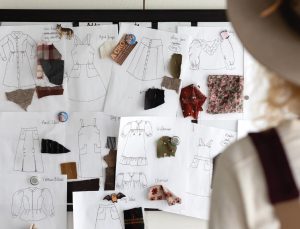
Fisher’s office wall is lined with sketches and fabric swatches.
Slow fashion, on the other hand, means ethically employing workers to make garments using responsibly sourced fabrics and sustainable methods. RevivALL makes all its garments using deadstock fabric — leftovers from retailers — which Fisher sources from a warehouse in Los Angeles. The warehouse is enormous, encompassing an entire city block, and packed floor to ceiling with pallets upon pallets of fabric: a visual testament to the sheer volume of waste created by the fashion industry. “I really believe that we could stop producing fabric and clothing today and still sustain ourselves for years,” says Fisher. RevivALL only employs American-based artisans, people she knows personally, to craft its garments. Two women in Oregon, Monica and Addy, make the brand’s signature unisex wool overalls. Working on the rest of the garments are three seamstresses in Bozeman, a group of Hutterite women in northern Montana, and a small production house in Tennessee.
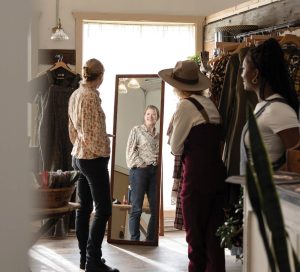
RevivALL Clothing boutique, located just north of downtown Bozeman, offers comfortable, intimate interiors bathed in soft light, inviting an afternoon of shopping and self-care.
In preparation for my interview with Fisher, I spent a lot of time browsing RevivALL’s online store (revivallclothing.com). Her designs run the gamut, from wool overalls to lightweight cotton jumpers to dreamy, prairie-inspired dresses and blouses. Most of the models on the website are Fisher’s close friends or coworkers, the real women and men who inspire her work. For instance, Fisher named one skirt the “Lacey Jean” after a woman who championed RevivALL in its early days. “It was 2015 or 2016, and a shepherdess in Oregon [Lacey Jean] posted a picture of herself on Instagram working in a pair of my wool overalls,” Fisher recalls. “She helped me gain my first niche following.”
Fisher dubs RevivALL’s aesthetic “prairie modern,” which makes sense at face value. The pieces feel distinctly of the land, executed in colors you find in nature, bringing to mind a timeless Western style. But in embracing the label, Fisher stays diligent about recognizing the real and violent history of pioneers on America’s prairie. “It’s never been my goal to romanticize a historical period.” Instead, RevivALL’s creations are about honoring craft, appreciating available resources, and making radical choices to consume less. They’re about building a succinct, wearable wardrobe comprised only of garments that bring the wearer joy.



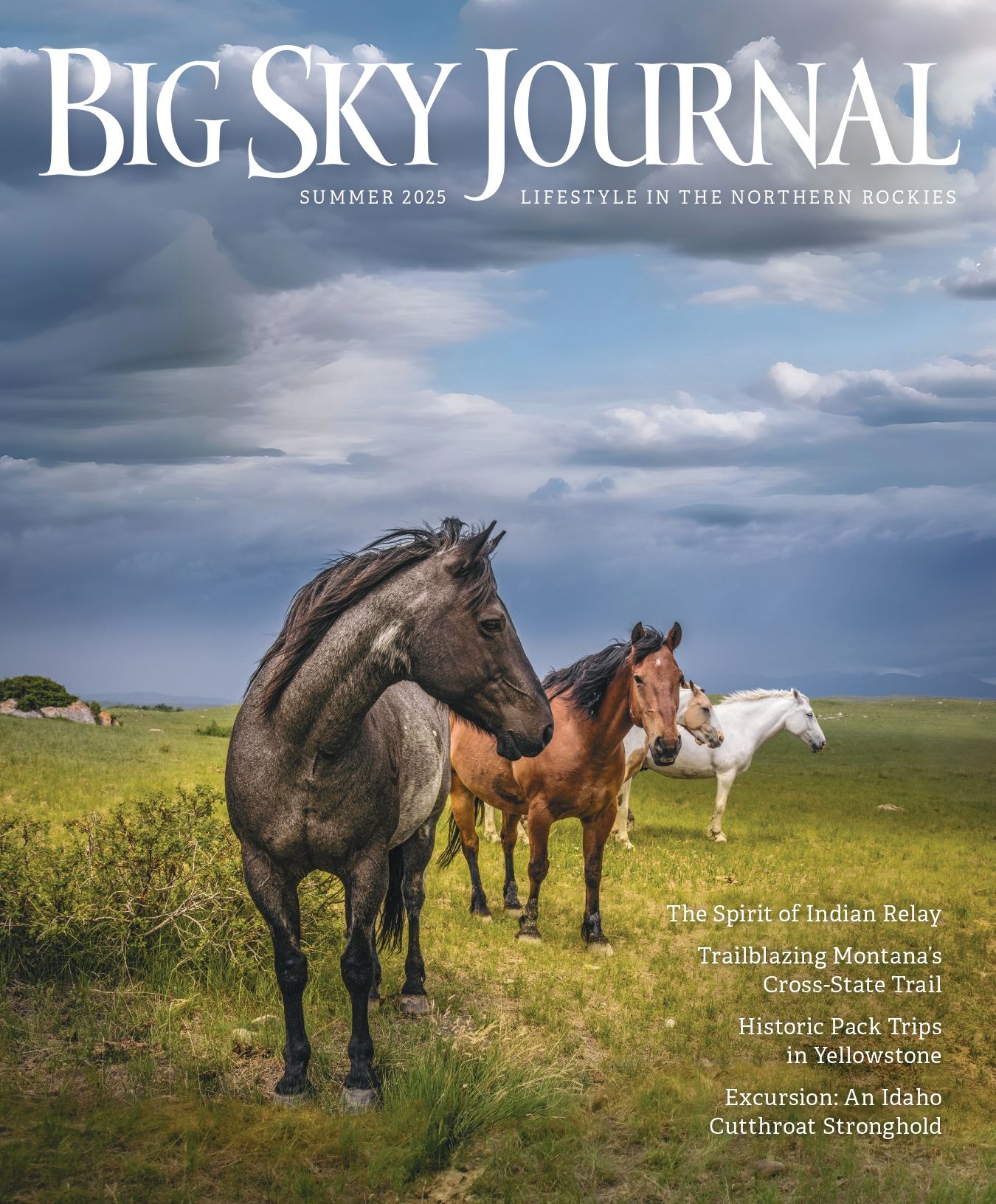
No Comments